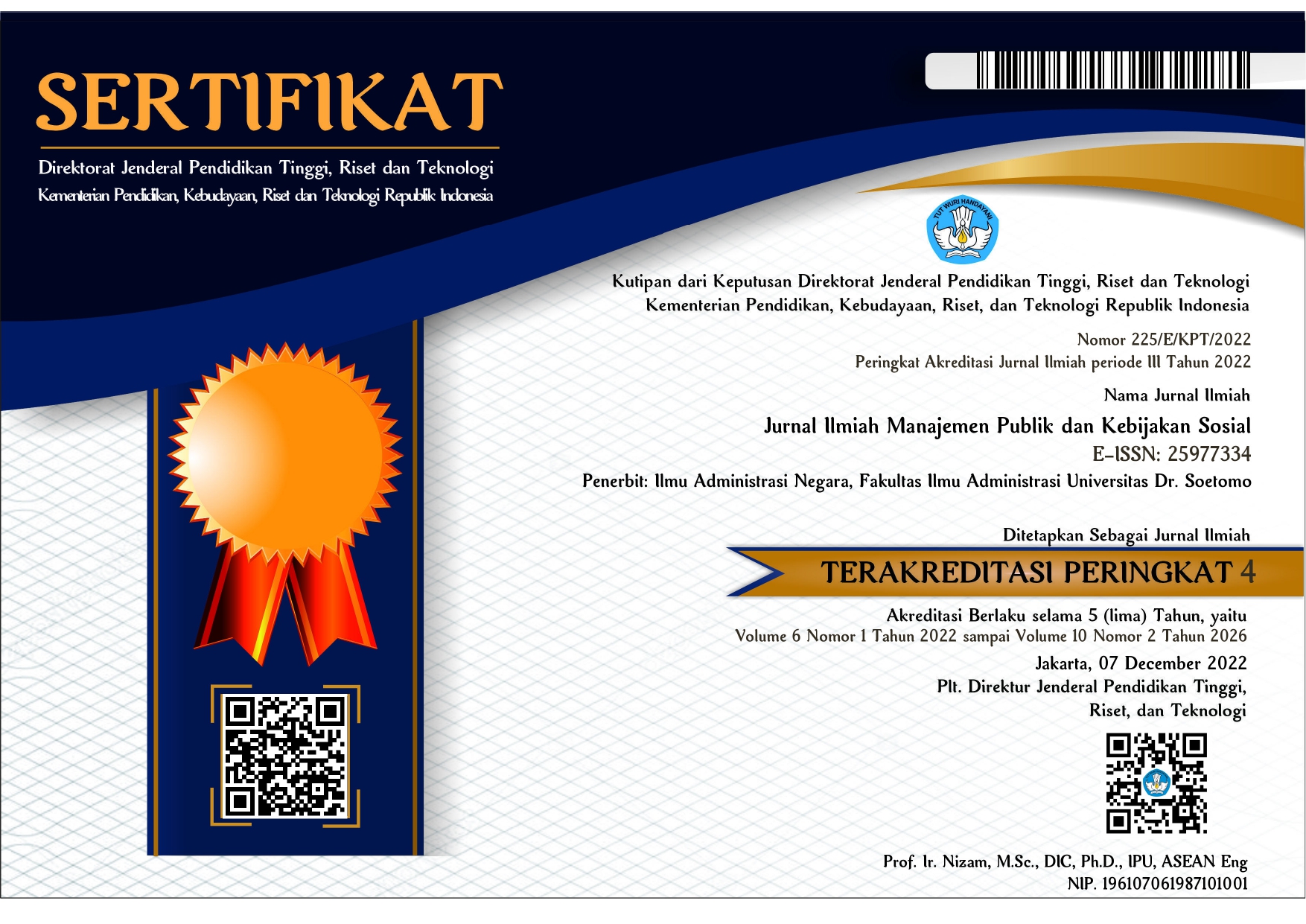Pendekatan Bottom Up Budgeting dalam Penganggaran Pemerintah Daerah (Studi tentang Penganggaran Partisipatif di Komunitas Nelayan Miskin di Kawasan Pantai Prigi Kabupaten Trenggalek)
 Abstract views: 1175
,
Abstract views: 1175
,
 PDF downloads: 1215
PDF downloads: 1215
Abstract
Development programs dan projects funded by public budget (APBN and APBD) are frequently not inline with needs of the local fishermen. Due to this situation, there shoud be a participative forums to facilitate and accommodate interests of local communities in the formulation process of public budgeting. In the context of APBD (local government budget) budgeting, participatory events are implemented in form of Musrenbang (Discussion for Development Planning). The current article intends to describe and critically analise participatory forums of Musrenbang utilised by fishermen to participate in the process of APBD budgeting. Also, the paper aims at analising prominent constraining factors to optimise participation of local fishermen in the Musrenbang forums as manifestation of bottom-up budgeting approach. The article is written based on reseach conducted in the Regency of Trenggalek and the coastal area of Prigi. This study applies qualitative approach with analytical descriptive as its type. Data of the research are collected through interview, observation, and documentation. Furthermore, collected data got analysed in three stages include data condensation, data display, and drawing conclusion. The results demonstrate that the Musrenbang forums get executed in five phases as follows (1) village level Musrenbang; (2) sub-district level Musrenbang; (3) SKPD (local government agencies) Forum; (4) regency level Musrenbang; and (5) Pasca regency level Musrenbang. The local fishermen are mostly able to directly participate only at village level Musrenbang as  participation at higher level Musrenbangs is commonly in form of representative participation. Quality of participation is also considerably weak because of time lack, education lack, inappropriate timing, and apathy of fishermen.
References
Berner, Maureen, (2001), Citizen Participation in Local Government Budgeting, Popular Government, Spring 2001
BIGG, (2005), Panduan Penyusunan Pedoman Penganggaran Bagi Masyarakat, dipublikasikan oleh Building Institutions for Good Governance (BIGG), www.bigg.or.id
Caroline Paskarina, (2005), Perencanaan Partisipatif : Model Alternatif Dalam Pembangunan Daerah, www.jurnal-kopertis4.org
Ebdon, Carol And Franklin, Aimee, (2004), Searching for a Role for Citizens in the Budget Process, International Journal of Public Budgeting &Finance /Spring 2004
Fubbs, Joan, 1999, The Budget Process and Good Governance, Occasional Paper Series , Mozambican Office, Rua Licenciado Coutinho No. 77
Katrina, Loimann & Ole-Moiyoi, (2003), Community Participation In The Planning And Management Of Marine Protected Areas : A Study Of Kenya And The Philippines, Thesis, Submitted In Partial Fulfillment Of The Requirements For The Degree Of Bachelor Of Arts With Honors In International Relations, Brown University Providence, Rhode Island
Krafchik, Warren, 2001, Can civil society add value to budget decision-making? A description of civil society budget work, International Budget Project
Miles,M.B, Huberman,A.M, dan Saldana,J. (2014). Qualitative Data Analysis, A. Methods Sourcebook, Edition 3. USA: Sage Publications.
Moleong, Lexy J. (2017), Metodologi Penelitian Kualitatif, Edisi Revisi, PT. Remaja, Jakarta
Redhi Setiadi dan Wawan Sobari, (2004), Perencanaan anggaran Partisipatif (participatory budgeting), Artikel dipublikasikan oleh Jawa Pos Istitute of Pro-otonomi (JPIP), 29-07-2004, www.jpip.org
Wampler, Brian, 2007, A Guide to Participatory Budgeting, Washington DC: World Bank
---------, Undang-Undang nomor 33 tahun 2004 tentang Perimbangan Keuangan Antara Pemerintahan Pusat Dan Daerah, Penerbit Arkola, Surabaya, 2004
----------, (2003), Undang-undang Nomor 17 tahun 2003 tentang Keuangan Negara, Pemerintah Republik Indonesia
-----------, (2004), Undang-Undang Nomor 25 Tahun 2004 tentang Sistem Perencanaan Pembangunan Nasional, Pemerintah Republik Indonesia
-----------, (2014), Undang-Undang Nomor 23 Tahun 2014 tentang Pemerintahan Daerah, Pemerintah Republik Indonesia
Authors who publish with JIMPKS: Jurnal Ilmiah Manajemen Publik dan Kebijakan Sosial agree to the following terms:
-
Authors retain copyright and grant the journal right of first publication with the work simultaneously licensed under a Creative Commons Attribution License (CC BY-SA 4.0) that allows others to share the work with an acknowledgment of the work's authorship and initial publication in this journal.
-
Authors are able to enter into separate, additional contractual arrangements for the non-exclusive distribution of the journal's published version of the work (e.g., post it to an institutional repository or publish it in a book), with an acknowledgment of its initial publication in this journal.
-
Authors are permitted and encouraged to post their work online (e.g., in institutional repositories or on their website) prior to and during the submission process, as it can lead to productive exchanges, as well as earlier and greater citation of published work.










